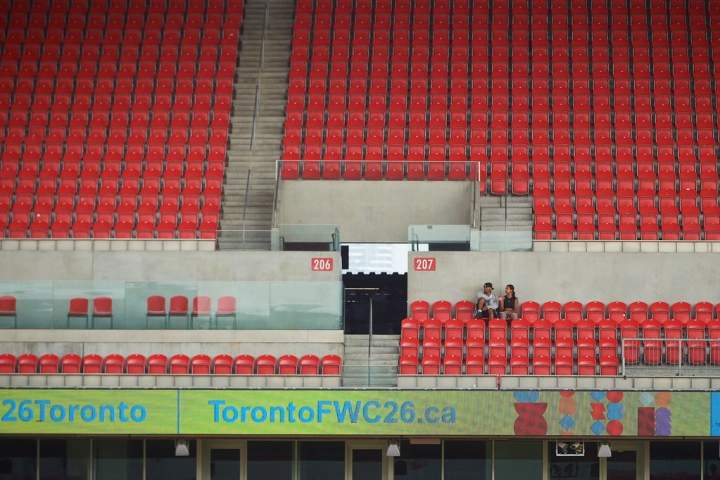Health
Toronto Launches Wastewater Surveillance for FIFA World Cup Safety

Toronto is set to implement a wastewater surveillance program aimed at detecting the spread of diseases during the FIFA World Cup next summer. This initiative, announced by the city’s Public Health unit, involves collecting sewage samples from areas with high concentrations of fans and testing them for various pathogens, including COVID-19, influenza, and respiratory syncytial virus (RSV).
Dr. Michelle Murti, Toronto’s new Medical Officer of Health, emphasized the importance of this pilot program. “It’ll just be one more piece of information that we have as part of a larger suite of information that we’re looking at to make sure that we’re keeping people safe and healthy through the games,” she stated. The city anticipates around 300,000 out-of-town visitors during the six matches scheduled to take place starting in June 2026.
Expanding Disease Monitoring Capabilities
The initiative follows the closure of Ontario’s COVID-19 wastewater surveillance program, which had provided near real-time data on virus prevalence until its conclusion last year. According to Dr. Fahad Razak, an internal medicine specialist at St. Michael’s Hospital, adapting this technology for a large-scale event like the World Cup is a forward-thinking approach to address public health needs.
Dr. Razak noted that the previous program should have been sustained and its potential for broader disease detection explored. He cited the example of Windsor-Essex County, which successfully used wastewater surveillance earlier this year to identify a rise in measles infections. “If you have a high pocket of unprotected people and you have the emergence of the measles signal within that area, that’s an area where you’d want to do your best from a public health perspective to try and prevent spread,” Dr. Razak explained.
In addition to monitoring viral infections, Dr. Razak highlighted the potential for using wastewater analysis to track opioid use, thereby identifying areas with a contaminated drug supply during the World Cup. “The critical question here is – can you use it to make decisions and to intervene in a way that saves people’s lives or reduces illness?” he asked.
Challenges and Future Implications
Dr. Lawrence Goodridge, co-lead of the Guelph Wastewater Epidemiology Lab for Public Health, pointed out that the province’s decision to end its extensive wastewater program—previously monitoring about 75 percent of the population—has led to the development of smaller-scale initiatives like the one in Toronto. While he believes the pilot program will be beneficial in the event of a major outbreak during the games, he cautioned that its reach may be limited.
“People are going to be moving around, they’re coming into Toronto, but they’re also going to be moving around through the province for the World Cup,” Dr. Goodridge noted. He stressed that this pilot will help evaluate the effectiveness of wastewater surveillance for future large-scale events within the city.
As Toronto gears up for the FIFA World Cup, this innovative public health strategy aims to enhance safety measures for both residents and visitors, ensuring a healthier environment during the festivities.
-

 Science2 months ago
Science2 months agoToyoake City Proposes Daily Two-Hour Smartphone Use Limit
-

 Health2 months ago
Health2 months agoB.C. Review Reveals Urgent Need for Rare-Disease Drug Reforms
-

 Top Stories2 months ago
Top Stories2 months agoPedestrian Fatally Injured in Esquimalt Collision on August 14
-

 Technology2 months ago
Technology2 months agoDark Adventure Game “Bye Sweet Carole” Set for October Release
-

 World2 months ago
World2 months agoJimmy Lai’s Defense Challenges Charges Under National Security Law
-

 Technology2 months ago
Technology2 months agoKonami Revives Iconic Metal Gear Solid Delta Ahead of Release
-

 Technology2 months ago
Technology2 months agoSnapmaker U1 Color 3D Printer Redefines Speed and Sustainability
-

 Technology2 months ago
Technology2 months agoSolve Today’s Wordle Challenge: Hints and Answer for August 19
-

 Technology2 months ago
Technology2 months agoAION Folding Knife: Redefining EDC Design with Premium Materials
-

 Business2 months ago
Business2 months agoGordon Murray Automotive Unveils S1 LM and Le Mans GTR at Monterey
-

 Lifestyle2 months ago
Lifestyle2 months agoVictoria’s Pop-Up Shop Shines Light on B.C.’s Wolf Cull
-

 Technology2 months ago
Technology2 months agoApple Expands Self-Service Repair Program to Canada









